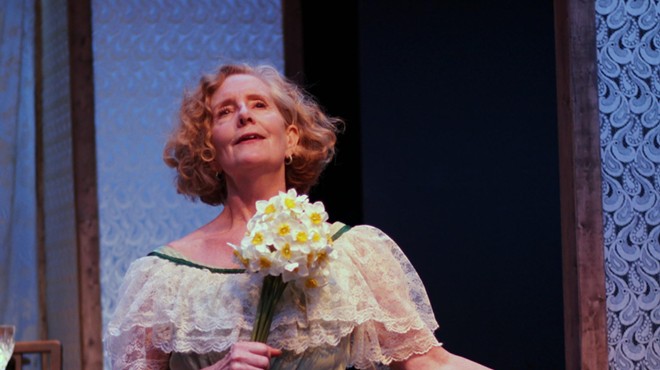I was always word-drunk," says poet, actor, and playwright Adam LeFevre. "I was a good eater at the breast. Words are food. They feel like food, that kind of voluptuous thing in the mouth. That nom-nom-nom."
LeFevre's just-released poetry collection A Swindler's Grace (Western Michigan University Press, 2016) may spark widespread bouts of word-drunkenness. Praised by Marvin Bell ("brainwork and heartwork of a high order") and David St. John ("an unflinching knife-blade of intelligence"), LeFevre's third book is cause for celebration. Though he's published poems in such prestigious journals as American Poetry Review, The Paris Review, and Ploughshares, and his chapbook Ghost Light (Finishing Line Press, 2012) won the Starting Gate Award, his last full collection was 1978's Everything All at Once (Wesleyan University Press).
He's spent most of the intervening decades on stage and onscreen. You may not recognize LeFevre's name, but you've probably seen his face. He's a hardworking character actor, a leading light of the "Oh, that guy" galaxy. TV credits include 12 guest spots on Law and Order ("I was only the perp a couple of times. Sometimes a judge, most often the parent of victims. I did a lot of weeping.") and a phalanx of bartenders, cops, and lovable mooks. On the big screen, he's played everything from Karl Rove in Fair Game to Man in Helicopter in The Dictator; his film debut was John Sayles's Return of the Secaucus 7 (full disclosure: as a multitasking production assistant, I was filmed driving past him hitchhiking).
He's also appeared in Broadway musicals Priscilla, Queen of the Desert; Guys and Dolls; Mamma Mia!; and Footloose—commuting from New Paltz. A long-running show can be a grind, but the train ride offers contemplative time. "It's right on the river. Can't beat moving water."
LeFevre grew up in Coeymans, on a bluff overlooking the Hudson. His father was a doctor who made house calls, sometimes accepting produce and homemade sausage in trade for his services. "He really covered a wide swath of territory," LeFevre recalls. "The phone would ring in the middle of the night, and I'd hear him throw on his clothes, go to the refrigerator, swig down some milk—it came in bottles then. The car would start and he'd be off. And I'd lie awake, listening for the sound of tires on gravel that meant he was back."
Ira LeFevre, who later ran Albany Medical Center's ER, had a colorful past. As a Navy flight surgeon turned Marine, he survived some of the deadliest bloodbaths of WWII's Pacific theater. While still in the service, he started corresponding with Helen Rhodes, a spirited young woman who worked for Schenectady's WRGB, one of America's first TV stations. ("There were maybe six television sets in Schenectady," LeFevre says. "She had a hell of a time selling ads.") After the war, he tried professional boxing. (LeFevre: "I think he had three fights. He got his ass handed to him.") Helen covered one of these bouts, watching Ira get pulped by a 6'6" black southpaw. "The harder he hit him, the more Dad stood back and smiled," LeFevre reports. "She said, 'This man is either crazy or very special.'" They married in 1948.
LeFevre calls his father "a man's man, John Wayne kind of guy." But he also recalls Ira watching ballet dancer Edward Villella on "The Ed Sullivan Show" and saying, "Now there's an athlete." LeFevre's takeaway: "He was clearly offering us a buffet of what we could do."
In high school—an all-male military academy—LeFevre played football, baseball, and basketball. He also loved poetry. Smitten by Shakespeare and e.e. cummings, he wrote a sonnet with no capital letters—"the poem of a horny, 14-year-old virgin boy"—for a girl he adored. "It was so full of feeling, and so awful," he recalls fondly.
Recruited for football, he entered Williams College as "a premed and big fat jock." But his dorm advisors were actor David Strathairn and future Secaucus 7 producer Jeffrey Nelson. "I didn't have a chance," LeFevre says happily. The athlete's first role was a natural: Charles the Wrestler in Shakespeare's "As You Like It." LeFevre adopted a pro-wrestling "Nazi Bad Guy" persona, using a German accent copped from "Hogan's Heroes" and flexing his muscles on cue. "It brought the house down," he says. "I was hooked. What power!"
He switched to an English major, writing poems for the college literary magazine (including "Sweet Wet Rosie," an ode to a stripper penned in "a bump-and-grind rhythm") and one-act plays. His first full-length, "Yucca Flats," was accepted by the National Theatre Institute, landing him an agent and a 1973 production at Manhattan Theatre Club.












